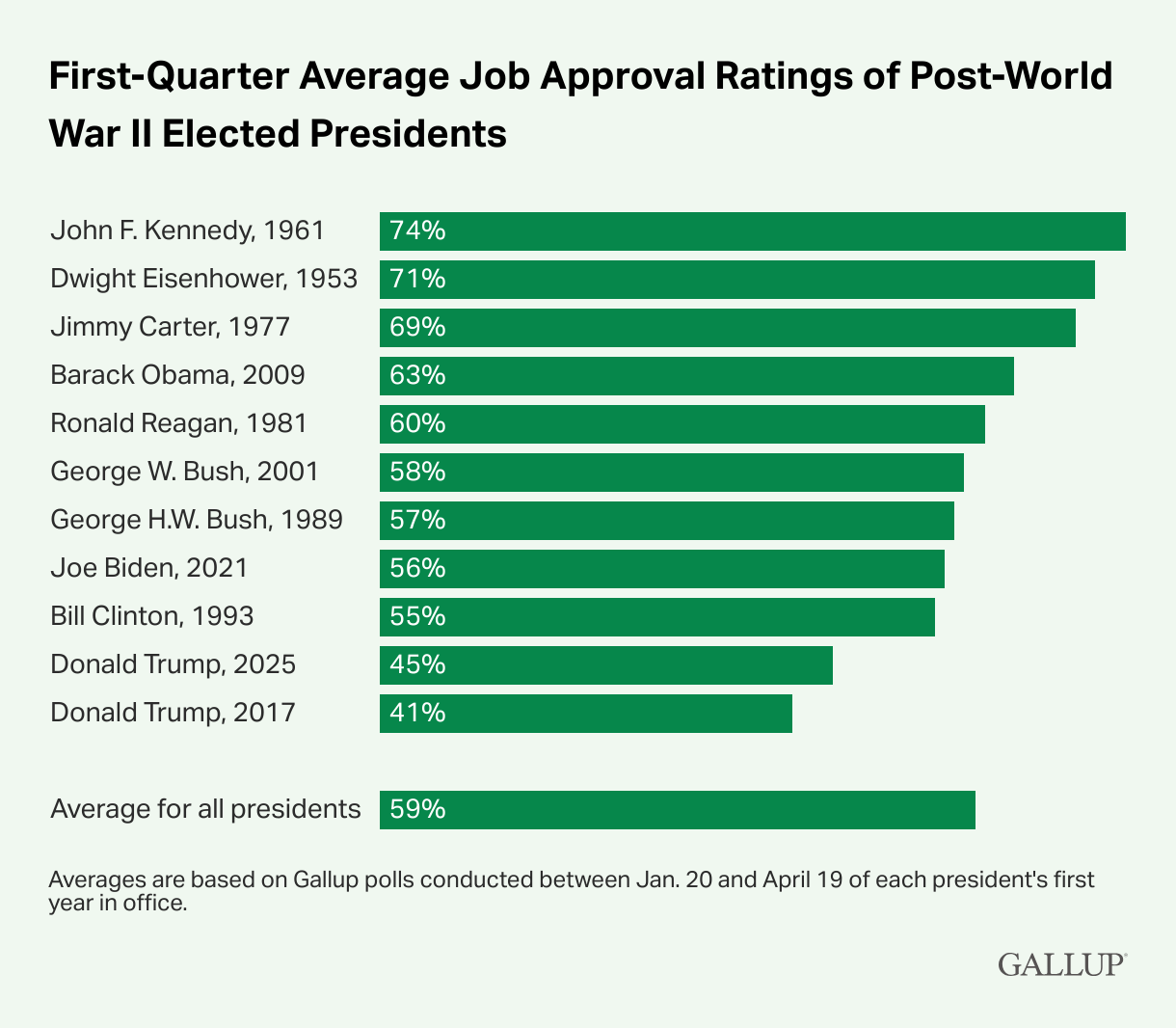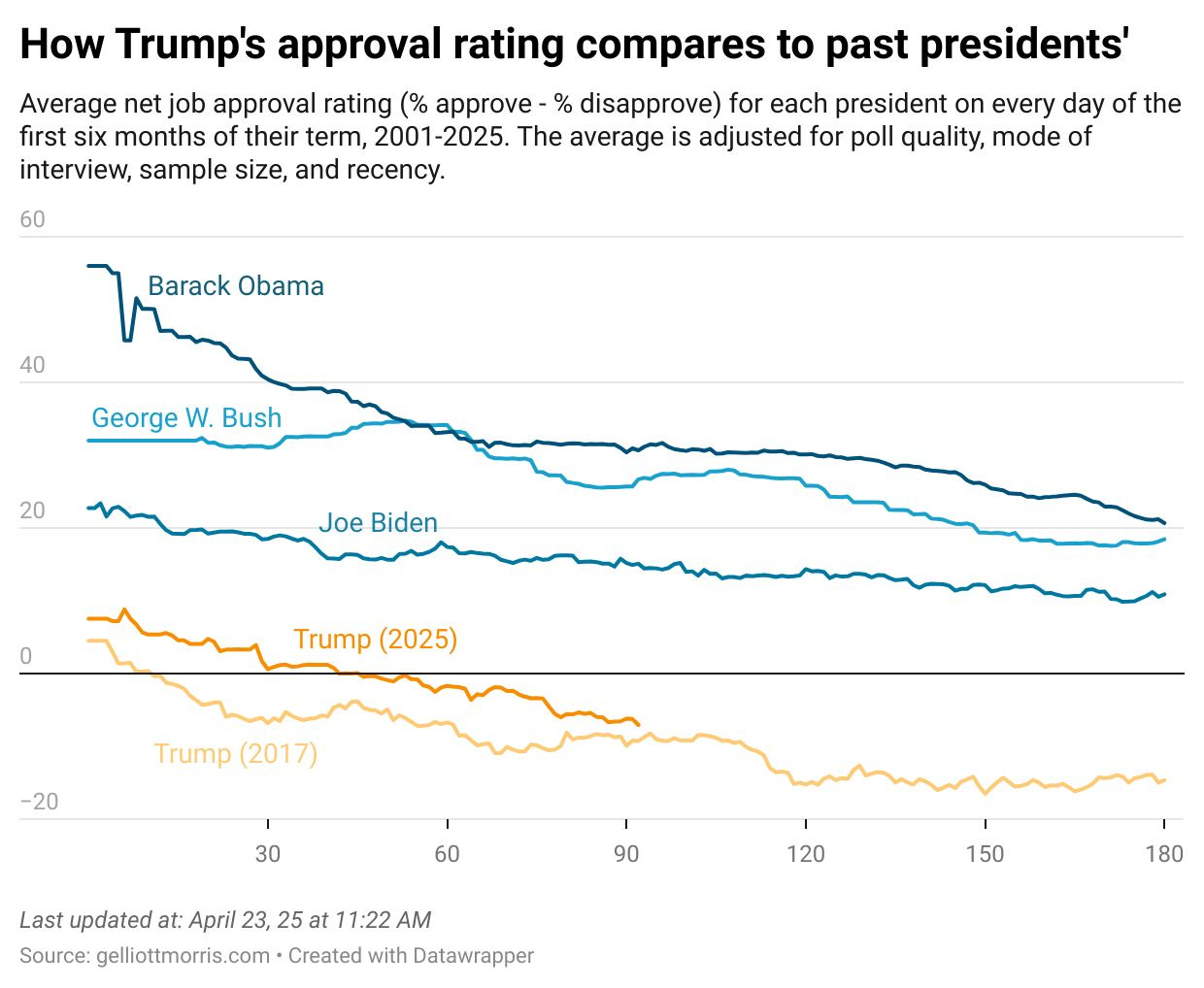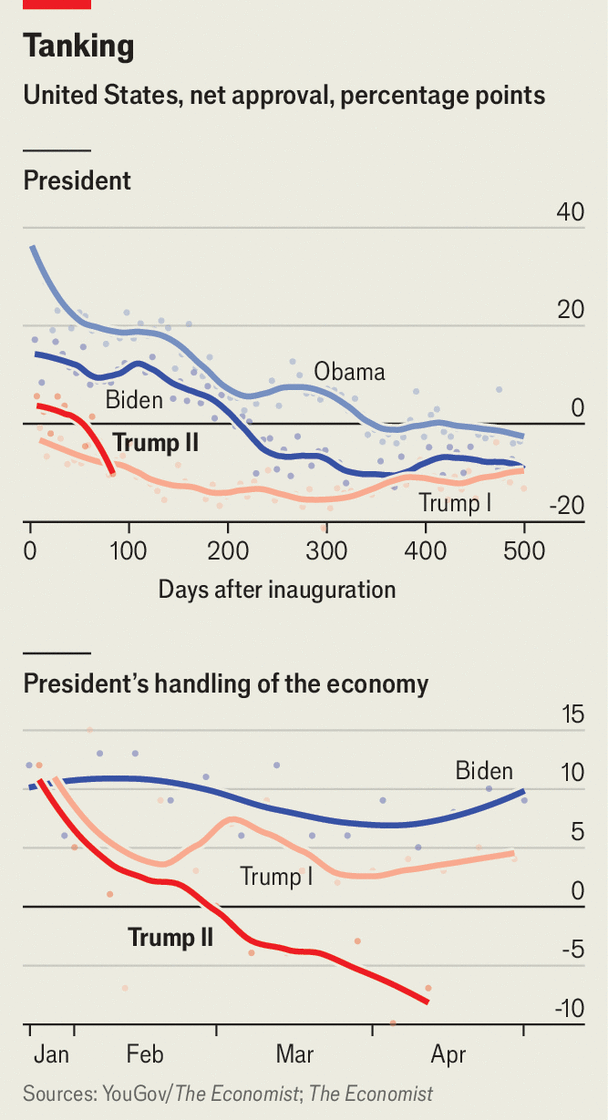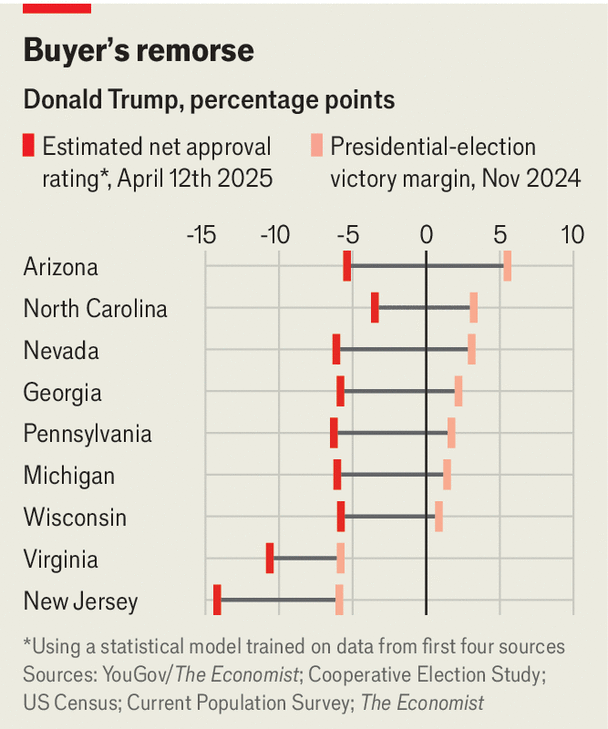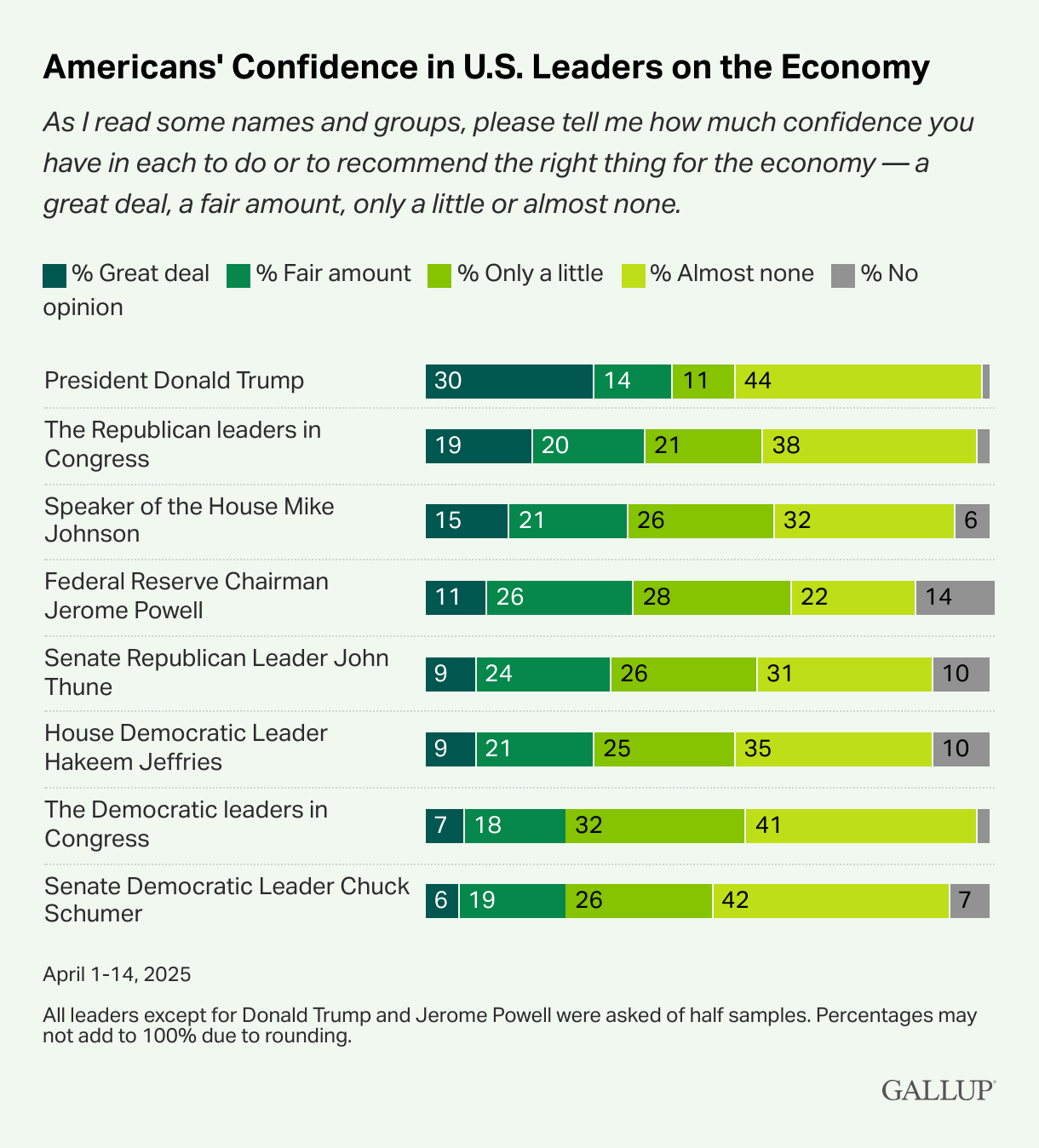A Strong Start
A handful of presidents have begun their terms with enough energy and focus to produce an extraordinary first 100 days. Franklin Roosevelt’s start was so impressive that it became the benchmark by which we measure modern presidencies. Ronald Reagan began his presidency so strongly that The New York Times, which hated him, conceded that “Mr. Reagan has established his goals faster, communicated a greater sense of economic urgency, and come forward with more comprehensive proposals than any new President since the first 100 days of Franklin D. Roosevelt.”
Barack Obama also came out of the gates fast. Facing a global economy in free fall, a strong Democratic majority in Congress, and substantial public support, Obama guided a stimulus package through Congress, strengthened the State Children’s Health Insurance Program, and expanded protections for equal-pay lawsuits. His popularity plummeted.
Other presidents began badly. William Henry Harrison died one month into his presidency. Lincoln’s honeymoon period was cut short by the onset of the Civil War just 39 days after his inauguration. Kennedy launched the disastrous Bay of Pigs invasion of Cuba after only 88 days in office (although his popularity did not suffer). Trump got off to a terrible start in 2017 when the courts knocked down his Muslim travel ban, and he introduced a health care bill that was so weak that the House refused to vote on it. His approval rating began at record lows and continued to sink even lower.
Gallup averages polls conducted during a president’s first three months. Trump holds the two worst performances. He approaches his 100-day milestone admirably full of energy and resolve, but beset by policy blunders, economic gaffes, and personnel controversies. His approval ratings are plummeting across almost every demographic and policy area. This matters less to Trump than to legislators, local officials, and cabinet members who have tied their fortunes to his.
Disapproval Ratings
Those who treat Trump as God’s messenger don’t care, but his recent polls look terrible.
The Pew Research Center reports Trump’s approval rating at 40%, a seven-point decline in two months.
Similarly, an Economist/YouGov poll conducted between April 5 and 8 shows a net approval rating of -8, with 43% approving and 51% disapproving of his performance. This is a significant drop from his post-inauguration honeymoon.
The Silver Bulletin polling averages take a database of polls and adjust them for recency and proven quality. They reported Trump’s approval rating as 51.6% positive and 40% negative on Inauguration Day, for a net positive rating of 11.6%. As of April 9, Trump polls at 45.5% and 50.8% negative, for a net rating of -5.3%, meaning that his net approval rating dropped by 16.9% in less than 100 days. That’s bad, although Obama probably scored even worse during the financial crisis.
Not all polls matter equally. Trump cares most about public views of his inflation and immigration policies, since these two issues propelled his candidacy. Increasingly, his key policies are at least as unpopular as he is.
Inflation and tariffs. The same Economist/YouGov poll shows that only 28% of Americans approve of Trump’s handling of inflation, and only 33% approve of his tariffs.
Economic management. Amidst some of the worst economic indicators in decades, Reuters/Ipsos found that only 37% of Americans approve of Trump’s economic management, his lowest rating ever. The same poll indicates that 53% of Americans believe their financial situation is worsening, a sentiment not seen since 2001. Navigator Research gave Trump his worst net job-approval rating on the economy (-13%) since the company began tracking it in 2018.
Immigration. According to Fox News, Trump is even underwater on immigration, with a net approval rating of -1. Fox reported that his numbers on foreign policy (-14), the economy (-18), tariffs (-25), and inflation (-26) are all worse than his overall approval rating.
Deportations. Trump’s aggressive use of executive power has raised alarms and suggests that Trump is squandering what should be one of his most popular policies: deportations. The Reuters/Ipsos poll notes that 83% of respondents believe the president must adhere to federal court rulings. (What are the other 17% thinking?) In a survey this week, Americans said by a nearly 2-to-1 proportion that the Trump administration should abide by a court order to facilitate the return of a man wrongly deported to prison in El Salvador, Kilmar Abrego García — a court order the administration is flouting.
Worse for Trump, his declining popularity is not confined to Democrats.
Republicans. Enthusiasm for Trump is starting to weaken among Republicans. The Economist/YouGov poll indicates that Republican approval of Trump has dropped from 90% to 85% in recent weeks.
Independents. His approval among crucial independent voters has fallen by 12 points since January.
Hispanics and young people. The Economist analyzed YouGov data to determine that Trump now polls at 37% among Hispanics and at -25% among voters younger than 30.
Swing state voters. The same projection suggested that Trump now has a net negative approval rating in all six swing states that he carried in November (Arizona, Nevada, Georgia, Pennsylvania, Michigan, and Wisconsin).
Polls like this make Trump crazy. Or crazier. After a Fox News poll showed him with a 44% approval rating, Trump publicly attacked Fox owner and media mogul Rupert Murdoch for not firing the pollster responsible for the unfavorable numbers. Trump is aware that these polls influence public perception, especially on Fox.
Polls reflect deeper problems. Determined to surround himself only with enablers, Trump appointed people based on their loyalty, not their capabilities. The clowns have delivered a circus of scandals, leaks, flip-flops, comic incompetence, mixed messages, and visible infighting.
Tariffs. On tariffs, Trump himself has sent so many mixed signals and outright reversals that it takes a website to keep track of them all.
Hegseth. Defense Secretary Pete Hegseth has been an embarrassment at the Pentagon, which one of his closest aides recently described as “total chaos”. His entire senior team has either resigned or been fired, leaving the Pentagon in what one survivor characterized as “a free-for-all”.
Musk. Elon Musk’s tenure leading DOGE appears to be lurching to an unceremonious end after he lost power struggles with top administration figures, most recently with a high-volume shouting match with Treasury Secretary Scott Bessent. Nate Silver has Musk’s net popularity at -13%. Other polls have him lower.
Putin. Trump now resorts to begging Vladimir Putin to end the war in Ukraine. When he was caught flat-footed by Russia bombing Kyiv and killing at least a dozen people, he took to Truth Social to beg, “Vladimir, STOP!”. He then dispatched Steve Witkin to Moscow, where he is prepared to surrender to Putin’s demands. (Comedians now joke that Putin had an easier time taking over the US than Ukraine.)
Courts. The courts continue to frustrate his plans. Trump has repeatedly blamed “leftist” judges for getting in his way, but a remarkable number of Republican appointees are blocking his actions, often using strong language. Three GOP-appointed judges described the administration's actions as “brazen” and “on a path of perfect lawlessness.” On Wednesday, a Trump-appointed judge issued the second order for the administration to facilitate the return of a man it wrongly deported to an El Salvador prison.
So What?
Trump might try to muddle through by pressing forward with tariffs and risking a constitutional crisis by challenging the courts to enforce their orders. He plainly feels more untethered in his second term and appears more unhinged.
So far, Congressional Republicans have shown minimal appetite for reasserting their control over tariffs or spending, but this may change. Elected politicians are good at measuring public sentiment and very bad at defying political gravity for long. And 100 days is looking like a long time, especially for elected Republicans who poll behind Trump. (Of course, Trump can take some solace in how poorly leading Congressional Democrats have performed on matters related to the economy.)
Trump is reliably reckless. He has sparked widespread moral outrage by threatening values Americans take for granted—democracy, the rule of law, intellectual freedom, compassion, pluralism, and global connection. These aren’t abstractions; they’re an inheritance that makes America genuinely great.
Democrats, who are mostly still in denial about being comprehensively repudiated in November, have not crystallized a competing vision into a concise, potent message that can compete with Trump’s resentful populist grievances. Most business leaders have remained silent, despite deep misgivings about Trump’s economic policies. This is not only cowardly, but also bad business. A company that stands up for preserving critical American institutions stands to gain among the millions of customers who fled Tesla. (Ford? Nike? Salesforce? Stripe? Microsoft?)
We hardly need to defend every institution in American life, but Democrats must clearly defend the shared institutions that embody our values, including independent courts, universities, humanitarian organizations, businesses, and research organizations. Instead of a resentment-filled “Make America Great Again,” anti-Trump forces need a positive-sum message to “Build on What Makes America Great.”
This does not mean idealism. It means acknowledging that Trump is right to complain that many parts of our system are rigged while pointing out that it is Trump and his backers who are rigging our tax code, hammering our research universities, ordering inflationary tariffs, ignoring labor laws, and defying courts to favor the new autocrats who support them. It means insisting on well-controlled borders and immigration policies and not trying to build a majority political coalition around narrowly constructed identity politics.
Trump thrives on impulsive, dramatic gambles. He confuses recklessness with courage. But a movement built around spectacle inevitably frays. His administration is increasingly vulnerable to a determined, sensible, and committed opposition. Under these conditions, opposition will emerge, but like most emergent phenomena, it will evolve with trial and error instead of springing forth fully formed.
None of this means that Trump’s presidency has been a failure. He is off to a bad start, but he still has more than 1,400 days left. He enjoys the support of more than 40% of Americans, and half of them claim that he is a Messiah appointed by God. He spent most of his first term with approval ratings in the low forties. A few trade deals with countries he is hitting with high tariffs, especially China, and he will be back in business. He is making a mess, but just getting started.
Coda
For anyone who’s ever had a heart…




